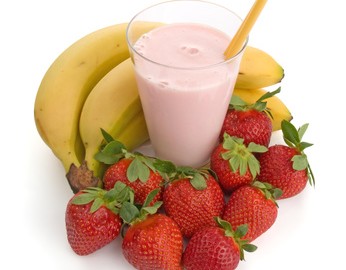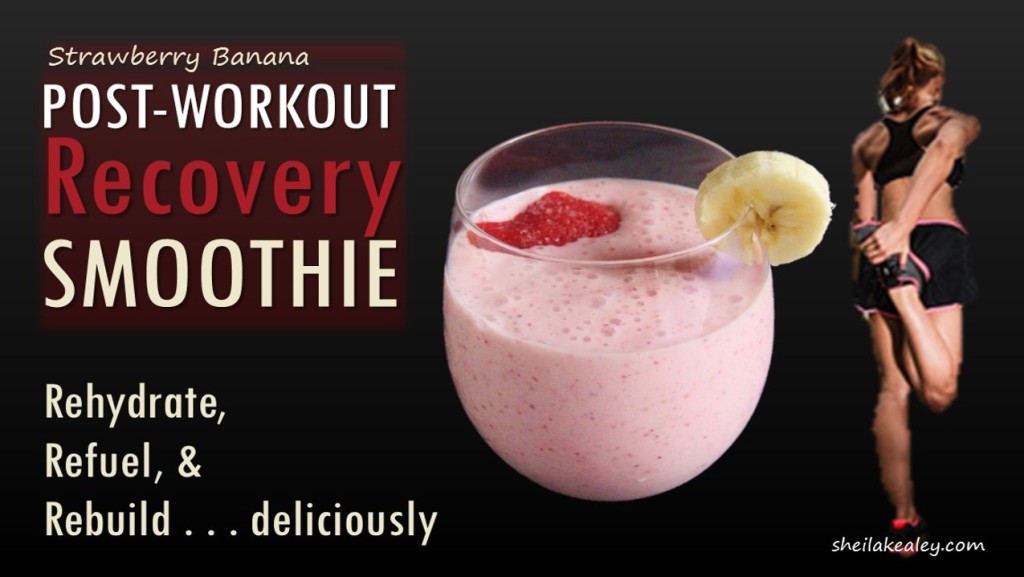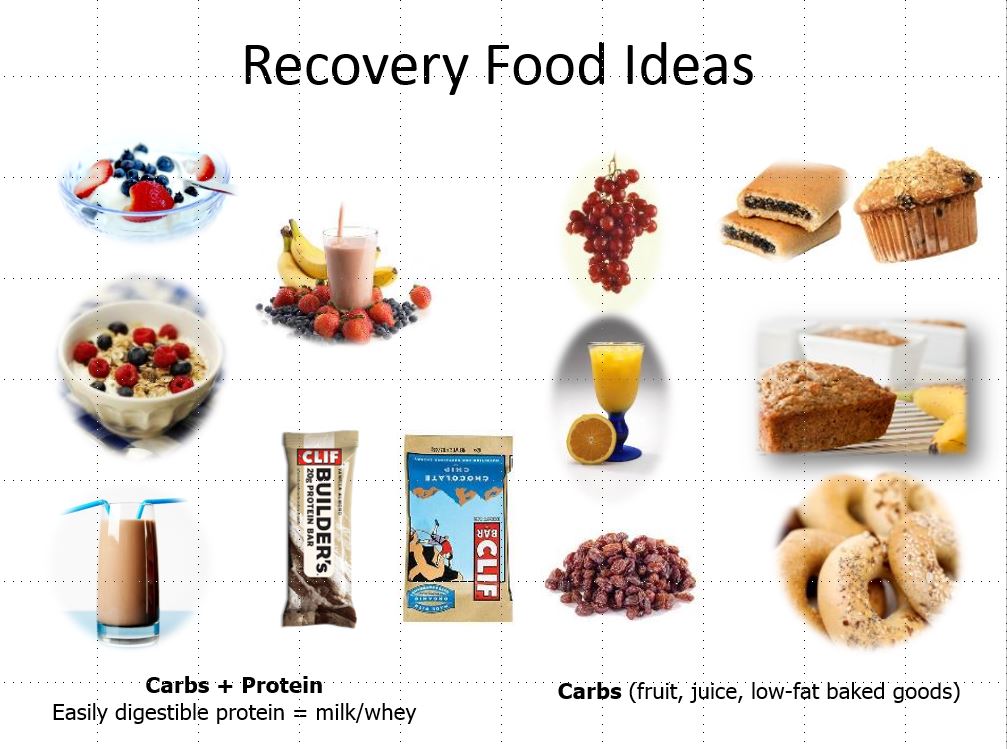Most athletes realize that proper recovery is critical to athletic success: rest allows your body’s systems to adapt to the stresses of training and hopefully make you stronger and faster. Many athletes are not as aware, however, that you can maximize your training gains, speed up the recovery process, and enhance subsequent performance by consuming the right foods or fluids at the right times following a workout.
Endurance or intensity training sessions deplete your muscles of glycogen (stored carbohydrate), which is your body’s preferred fuel during exercise. If you want to perform quality training sessions several days per week or workout twice a day, you have to be able to replenish these glycogen stores, and nutrition strategies should be an important part of your recovery plan.
Timing Is Important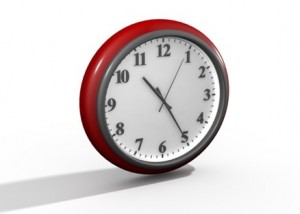
Finished your workout and cooldown? Your next priority should be rehydrating and refueling. You’ll want to drink enough to replace the fluids you lost though sweat. Your muscles are most receptive to replenishing glycogen right after you stop exercising. This is when blood flow is enhanced and your muscle membranes are more permeable to glucose and the effects of insulin, which helps promote glycogen synthesis. Some studies have suggested that during this so-called “glycogen window” your muscles replenish glycogen up to three times faster than at other times. Although this “glycogen window” can last up to 1 hour or more, experts recommend consuming carbohydrates immediately since this is when your muscles are most greedy for fuel.
However, emerging research suggests the post-exercise ‘window” may be wider, since earlier studies were performed on fasted individuals.
After a workout, consuming the right foods or fluids at the right times can maximize your training gains, speed up the recovery process, and enhance subsequent performance.
What Should You Eat?
Carbohydrate-rich foods or beverages are the best for recovery. Including some protein with high-carbohydrate foods will enhance muscle repair processes and speed glycogen replacement. Protein likely won’t help your next workout like carbs and fluids, but is important for long-term adaptations. This study (in resistance trained athletes) found that 20 g protein was optimal for muscle repair and synthesis. More protein is not better (and will not be used for muscle building or repair), so make sure protein intake is not at the expense of the carbohydrates your muscles are craving.
Research suggests that foods that rapidly raise blood sugar levels (with a high glycemic index or load) can enhance muscle glycogen synthesis further. For most people, foods that raise blood sugar levels aren’t desirable, but after a strenuous or workout these are the foods that will help you recover more quickly, so go ahead, and indulge your sweet tooth when it will have some benefit!
The 3 R’s of Recovery Nutrition
Sports Scientists highlight the following 3 R’s to recovery nutrition.
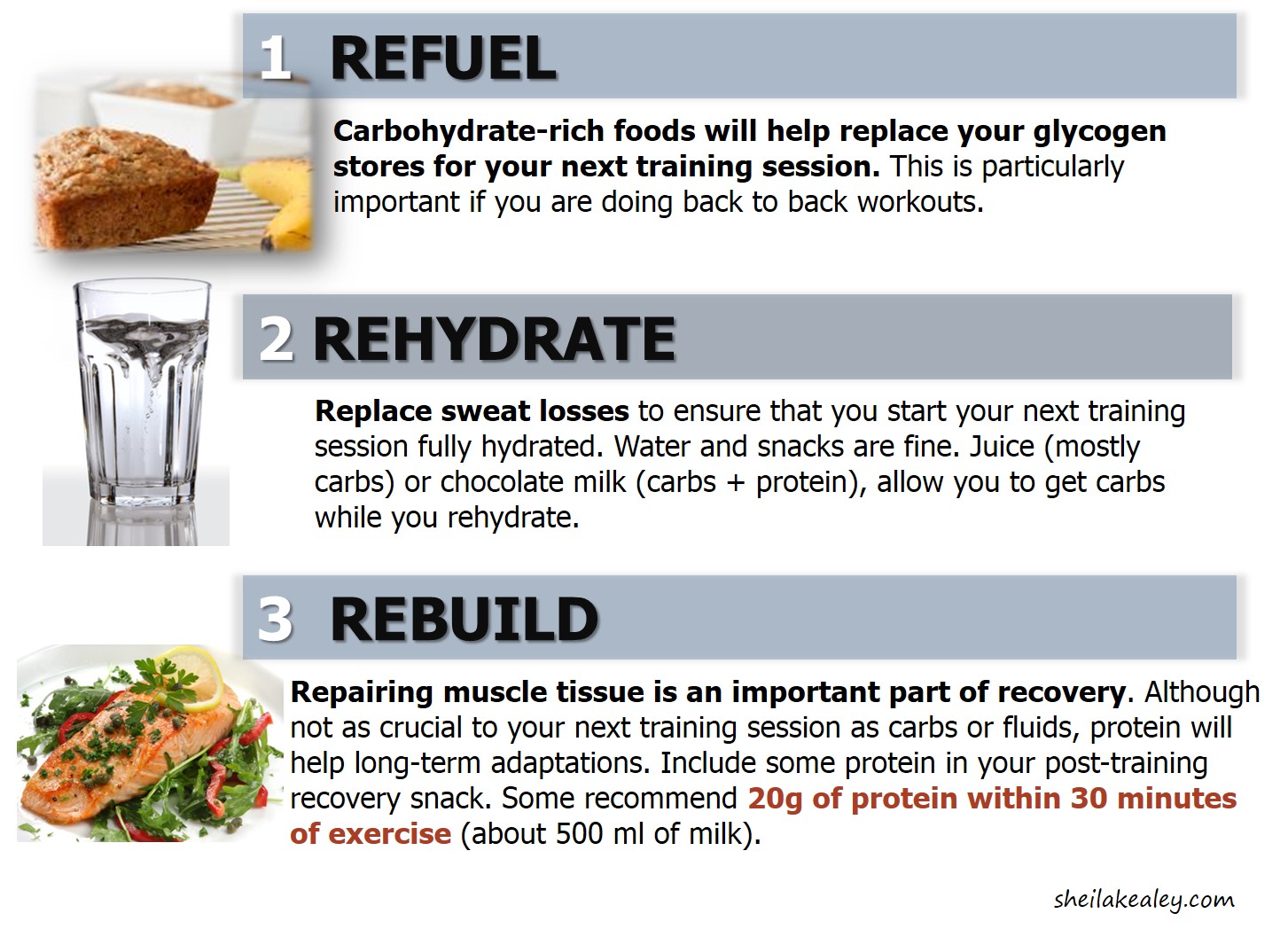 How Much?
How Much?
How much food you need depends on the extent that your activity depleted your glycogen stores. Interval training sessions and those longer than 2 hours demand significant amounts of glycogen. Exercise scientists recommend about 1-1.5 grams of carbohydrate/kg body weight within 15 minutes after stopping exercise, and then every 2 hours until your next complete meal. That’s about 50-120 grams of carbohydrates (200 – 480 calories) for most athletes. Here are a few examples:
- 55 kg (121 lbs) = 55-83 grams carbohydrates
- 65 kg (143 lbs) = 65-98 grams carbohydrates
- 75 kg (165 lbs) = 75-113 grams carbohydrates
Good Ideas for Recovery Foods
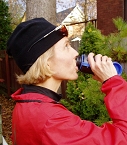
Beverages and carbohydrate containing foods will both help replenish glycogen stores, but choosing a beverage has the additional function of replacing lost fluids. Think of what you’ll be doing the 30 minutes after your workout and choose practical foods accordingly. For example, if you’re out for a long ski, bring something that won’t freeze in the car and that you can eat right after your ski or while you’re driving home. Choose foods or beverages that you’ll feel like eating after intense exercise. My favorite is usually chocolate milk and fruit or a handful of cereal. Or try this recovery smoothie . . .
If you didn’t consume all of your sports drink during your workout this is a good time to finish it. It will help replenish your fluids and provide some carbohydrates, but you’ll need additional carbohydrates since sports drinks formulated for activity don’t contain enough carbohydrates for optimal recovery.
Special sports nutrition and
recovery products are convenient and take some of the guesswork out of recovery nutrition. But it’s possible to achieve your recovery requirements with wholesome, inexpensive, and flavorful foods. Real foods will also help you meet other nutrient needs that are important for good health.
Most popular recovery foods also contain enough sodium or potassium to replace what you lost in your sweat during your workout. The graphic and list below provide ideas, and check food labels to choose tasty recovery foods that will help you meet your carbohydrate and protein requirements.
HIGH CARB
FRUIT/ FRUIT JUICES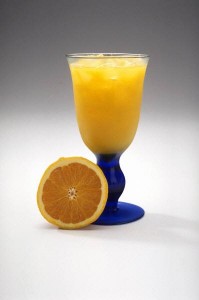
- 1 cup fruit juice (25-40 g carbs)
- 1 medium apple (20 g carbs)
- 1 medium orange (18 g carbs)
- 1 cup grapes (29 g carbs)
- 5-6 dates (31 g carbs)
BAKED GOODS/BREADS
- 1 slice lowfat banana bread (34 g carbs)
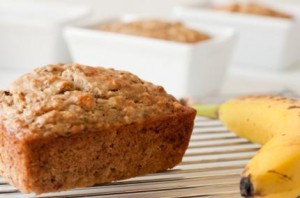
- 1 lowfat muffin (50 g carbs)
- 1 apple raisin cinnamon pita bread -Pita Break brand (47 g carbs)
- 2 large pancakes with syrup (50 g carbs)
- 1 slice whole wheat bread (24 g carbs)
- 2 Fig Newton Cookies, fat free (31 g carbs)
- 2 Fig Newton Cookies, regular (20 g carbs)
- * 1 medium bagel (40 g carbs)
MISC
- * 6 low fat graham cracker squares (32 g carbs)
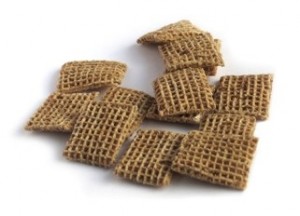
- * 1 cup breakfast cereal – e.g., Cheerios, wheat flakes (24 g carbs)
- * Baked Potato (35 g carbs)
- * 10 pretzel twists (47 g carbs)
- * 1 tbsp. honey (17 g carbs)
- 2 tbsp. Chocolate syrup (25 g carbs)
- 1 tbsp. jam (13 g carbs)
CARB/PROTEIN COMBINATIONS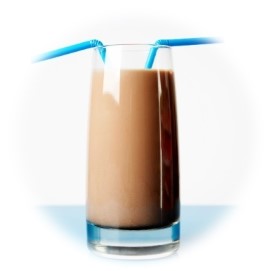
- 2 cups chocolate milk (52 g carbs/16 g protein)
- 1 cup breakfast cereal with ½ cup nonfat milk and ½ medium banana (47 g carbs/13g protein)
- 1 cup fruit yogurt (47 g carbs/11 g protein)
* = high glycemic index (> 70)
More Sports Nutrition Articles
- Nutrition Strategies for Health and Athletic Performance
- Dietary Nitrates, Sports Performance, and Health
- Athletes Avoiding Gluten and Grains: Is There Good Evidence?
- The Iron Needs of Athletes: Who Needs More, and How to Get it Through Your Diet
- Healthy or Hype? Chocolate Milk for Recovery
- How Much Protein Do You Need?
- What Should I Eat Before I Workout?
- Energy Bars: What to Look for, Real Food Alternatives, and How to Make Your Own
- Will Beet Juice Improve Endurance Performance?
- You Fuel your Workouts, but How Does the Rest of your Diet Stack Up?
_________________
Updated July 7, 2015
Share This: